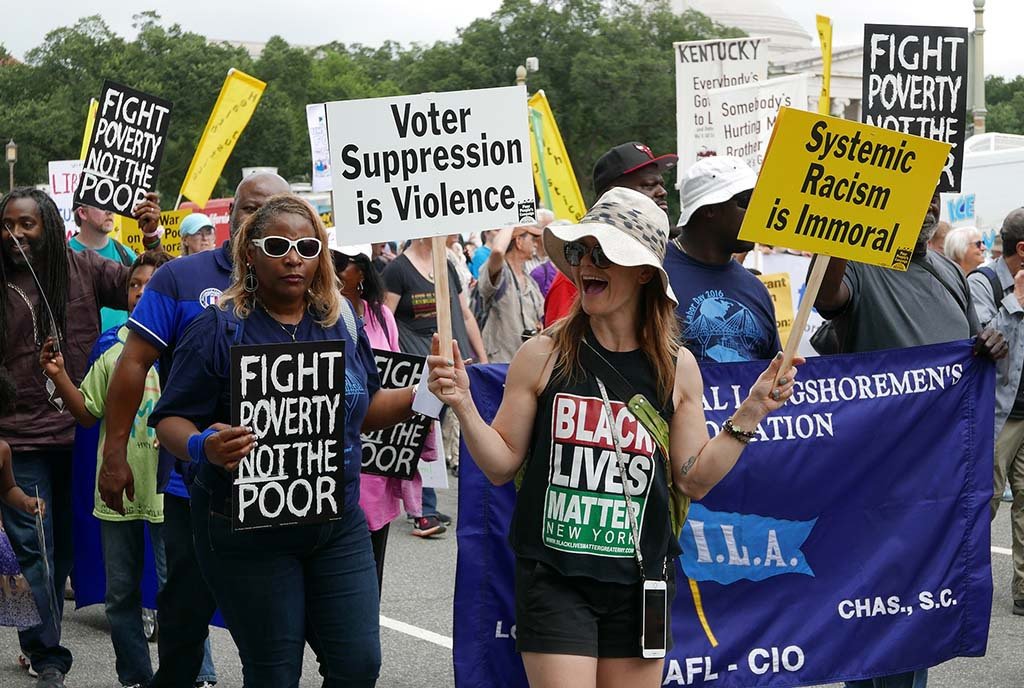
Disclosure: The author is the daughter of Rev. Dr. William Barber II, who is quoted in the article.
New York City is home to the most millionaires in the world. Yet, nearly all low-wage workers in the city are rent-burdened, with 25 percent of children within the city limits living in poverty. This is just a snapshot of the widespread and worsening issue.
“For too long, extremists have blamed poor people and low-wage people for their plight, while moderates too often have ignored poor people.”
Across the country, more than 40 percent of people do not have enough money in savings to afford a $400 emergency. As many people struggle to survive, homelessness increased last year by 12 percent. Amid the current political climate, intensified by the upcoming 2024 election, organizers of the Poor People’s Campaign are mobilizing. On March 2, 2024, the second Mass Poor People’s and Low-Wage Workers’ Moral March to state assemblies will take place. In over 30 states nationwide, poor and low-wage workers will gather to uplift their demands.
At a press conference on February 5 announcing the march at the National Press Club, Rev. Dr. William Barber II, the co-chair of the Poor People’s Campaign, said that poor and low-wage people have the power to determine elections. Still, too often they do not show up at the polls because political leaders ignore their issues and concerns.
“For too long, extremists have blamed poor people and low-wage people for their plight, while moderates too often have ignored poor people,” he said. As Barber noted, a 2020 report by Robert Paul Hartley, an assistant professor of social work at Columbia University, found that 34 million eligible poor or low-income voters did not vote in 2016.
“We are serving notice to our state legislatures…that we will not be ignored, that we aren’t going anywhere, and that poor and low-wage voters are mobilizing.”
The report, Unleashing the Power of Poor and Low-Income Americans: Changing the Political Landscape, found that poor and low-income voters aren’t voting because political campaigns do not speak to their issues. That is why the Poor People’s Campaign has intentionally organized around the issues impacting poor and low-income voters.
“As we have said and will continue to say, we are mobilizing and organizing, registering and educating people for a movement that votes—votes for healthcare and debt cancellation, votes for living wages and strong anti-poverty programs, votes for fair taxes and the demilitarization of our communities and world, votes for immigrant rights and more,” said Rev. Dr. Liz Theoharis, co-chair of the campaign, at the press conference.
Sign up for our free newsletters
Subscribe to NPQ's newsletters to have our top stories delivered directly to your inbox.
By signing up, you agree to our privacy policy and terms of use, and to receive messages from NPQ and our partners.
A Refusal to Accept Poverty
Weeks later, on February 21, simultaneous press conferences were held in over 30 states nationwide as poor and low-income people, advocates, faith leaders, and others explained why they would join the march.
Jeff Bezos, the former CEO of Amazon, made over $7.9 million an hour last year alone, while many low-wage workers work multiple jobs to pay their bills.
“We are serving notice to our state legislatures on both sides of the aisle to take action on the demands of the campaign—to serve notice that we will not be ignored, that we aren’t going anywhere, and that poor and low-wage voters are mobilizing,” said Savina Martin, the eastern chair of the Massachusetts Poor People’s Campaign.
As many other leaders did across the country, Martin noted the sobering fact that in America, poverty is the fourth leading cause of death. Lady Lawrence, who also spoke at the Massachusetts press conference, talked about her sister Doreen, who lost her home while battling cancer. “If she had not lost her home, she would still be alive. Housing security is public health. Her death is the result of policy choices,” Lawrence said.
Meanwhile, in North Carolina, Mary Hill, a cofounder of the Carolina Amazonians United for Solidarity and Empowerment (CAUSE), noted that Jeff Bezos, the former CEO of Amazon, made over $7.9 million an hour last year alone, while many low-wage workers work multiple jobs to pay their bills. Katie Lawson, who was able to secure housing after being repeatedly denied because of a criminal record and having to pay over 20 application fees, said that though she finally has secured housing, she has to work three jobs to keep it.
As many advocates across the country noted, those making minimum wage have to work over 100 hours a week to afford a two-bedroom apartment. Even while essential workers have continued to keep the country running during the pandemic, they are still underpaid. Rebecca Tisdale, a home healthcare worker, talked about how she made just $11 an hour while working during the pandemic.
The march in North Carolina on March 2 will take place on the same day as the last day of early voting for this year’s primary election. Advocates pledged that after the march, they would be headed to the polls, determined to make their voices heard on the ballot box.
Ahead of the presidential election in November, advocates with the Poor People’s Campaign will engage in over 40 weeks of organizing, registering, and educating poor and low-wage infrequent voters. They are determined to bring about policy change. As Martin noted, “We refuse to accept poverty as the fourth leading cause of death nationwide.”











